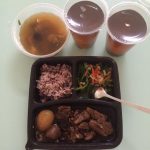81 Tagore Lane, TAG A, #01-11 Singapore 787502 ♦ Reservation : +65 6727 5599
Methods to Ensure Enough Milk Supply for Your Newborn!

If you are breastfeeding, you have probably wondered at least once whether you are producing enough milk for your little one or underfeeding them. It is totally understandable, and almost all nursing mothers will have this exact concern. It’s natural to worry about the growth of our babies, but you shouldn’t let it stress you out.
In case you notice a decrease in supply, know that it will not stay that way, and it can be increased back. Setting out with an optimistic mindset is the very first step to take!
Some mothers start having high production, which slowly decreases and becomes low. Some can’t produce enough and have to supplement the lack of milk with formula instead. Over the years researchers have found that many factors may affect breast milk supply over the years.
What if we say there are various things like your confinement diet plan that may help boost your milk production? That’s right! If the correct measures are followed, you may see an increase in your milk production.
Do note that different people have different breastfeeding experiences. What works for one may not work for another. Here are a few methods and pointers you can try out if your milk production has been low or you feel that you haven’t been producing enough milk for your baby.
Signs your baby may not be getting enough milk
That said, some general indicators can help let you know that your little one may not be getting enough milk during breastfeeding. Some of them include:
- Your baby hasn’t had consistent weight gain by 10 to 14 days old. Consult your paediatrician on the healthy weight range for your baby.
- You can see your baby sucking but not swallowing.
- Latching seems shallow or feels painful to you. An improper latch can prevent your baby from feeding enough breast milk.
- Your baby takes longer than 30 to 40 minutes per feed, and they tend to fall asleep shortly after you begin breastfeeding.
- Your baby is fussy or unsettled after feeds.
- Your baby is wetting less than six nappies in 24 hours after he is five days old, and his urine is dark yellow with a strong smell.
- Your baby poop less than twice a day by five days old. Infrequent poop might indicate that your baby is not getting enough milk.
- Your baby has jaundice. Some babies may develop jaundice as a result of not getting enough milk.
Signs your baby is getting enough milk
On the other hand, here are some signs that your baby is feeding enough. However, do keep in mind that these only serve as general guidelines. Please get your paediatrician’s advice for the most accurate answer for your baby.
- Your baby is feeding at least 8 to 12 times in 24 hours and doing two poops every 24 hours. The poops often have a yellow-mustard colour.
- Your baby latches off your breast independently, and he seems content and satisfied after each feed.
- Your baby is latched on properly, and you can see and hear your baby swallow.
- Your breasts don’t feel uncomfortable or painful during feeds; they feel softer after feeds.
Demand & Supply
The magical thing about your body is that it adjusts your milk supply according to how much your baby needs. In other words, it is a matter of demand and supply. Your body will keep producing milk as long as it is needed.
So, how do you ‘tell’ your body that it needs to produce more milk?
Suppose you want to increase the supply, nurse more often or try pumping more often. This gives a signal that there is a demand for production, and your body will continue producing more milk.
If you have to spend an extended period apart from your baby, this may affect the amount of breast milk produced. Emptying your breast milk regularly after feeds will help keep up your supply. Going the extra mile by holding skin-to-skin contact with your little one helps even more – it’s a powerful bonding experience and an effective way to boost lactation production!
Hydration

Hydration is key, and this holds true no matter what we are talking about! Dry skin? Hydrate. Dull complexion? Hydrate! Low milk supply? You guessed it – hydrate! In fact, if you are not consuming enough fluids, you would be at risk of dehydration, leading to other issues like fatigue and constipation in mothers. Feeling unwell would make mothers less likely to be able to breastfeed as much as they want, thus making them more stressed out. The increased stress would increase her cortisol levels, affecting her breast milk supply. Now, the good thing is you can hydrate yourself how you want. You can have other drinks, soups, and even certain fruits that boost hydration, such as watermelon, strawberries, and coconut water! Remember to not take a glass of sweet drink or fruit juice too often to avoid excessive sugar intake that may lead to excess caloric intake.
Modify Your Diet
The food you consume is essential to your milk production, especially within the first month after childbirth, also known as the confinement month. As breastfeeding starts soon after birth, you will need to ensure that the food consumed during your confinement supports your recovery well and has all the necessary ingredients and nutrition to support you as you breastfeed. But how do you know which ones are the best confinement food for breastfeeding? Confinement meal caterers like Tian Wei Signature advocate breastfeeding, and their meals are specifically planned to help boost milk supply. We include various traditional lactogenic herbs and ingredients like fenugreek, ginger, garlic, fennel and green papaya, which are traditionally known to increase milk production.
Certain ingredients like garlic can affect the odour and flavour of breast milk. If you include some garlic in your meals, the good news is that your baby will most likely like it as well! Studies have shown that babies of mothers who consume garlic latch on longer, especially during the initial stages of breastfeeding. Due to this, your body receives a signal that more milk needs to be produced, resulting in more production! As breast milk production largely depends on fluid intake, we also try to keep your daily drink as tasty yet healthy as possible to ensure you are well-hydrated. For that, we serve red dates tea for breastfeeding and to promote proper blood circulation.
Refrain from offering your baby pacifiers to delay feeding.
Babies somehow know when they are hungry and will give cues such as crankiness, fussing or crying. Avoid offering them pacifiers if you feel it is too early for feeding. Breast milk digests faster than formula, so your baby tends to get hungry more quickly when he/she is breastfed than when feeding formula. If your baby is breastfed, he/she should be fed whenever he/she wants. Feeding shouldn’t be replaced with an empty feed to delay feeding time. Pay attention to their hunger cues when feeding your baby instead of following a strict timetable. This is called ‘feeding on demand’ and will guide your body to provide an ample milk supply for your little one’s needs.
You will find that the more often you nurse, the higher your milk production will be as it gives your body the signal that milk is being emptied much quicker and the body must increase production.
What can I do if my baby is not getting enough milk?
1. Pay attention to your baby’s cues
One of the useful tips that you can learn is by paying attention to your baby’s movements and mood. In order to find out if your baby gets enough breast milk, you can first make sure you recognise your baby’s hunger cues. It would be easier for you to initiate feeding when your baby is hungry, which would often be when he starts crying or clinging on.
2. Take note of how frequently your baby is feeding
Newborns need to be fed at least 8 to 12 times within 24 hours during the first few weeks. This means a feed every 2 to 3 hours, including sleeping time at night. By the time your baby reaches 12 months old, his feed will gradually decrease to three to four times every 24 hours. Hence, pay attention to the number of times your baby is feeding in a day, along with the other signs mentioned in the earlier section, to have a general idea of your baby’s milk consumption.
3. Consult a doctor
After leaving the hospital, visit your paediatrician or health care provider regularly to check your baby’s weight to find out if he is getting enough nutrition from breast milk. Go to your baby’s paediatrician to evaluate his growth and development progress.
If you think your baby is not getting enough milk, and his appetite does not improve after you attempt at home, please immediately seek help from a paediatrician or a professional lactation consultant. Should the need arise, and the issue is due to low milk supply, your doctor may prescribe medication to help improve milk production.
4. Maintain a breastfeeding friendly diet
Your baby’s breast milk intake may be affected by several reasons you often did not expect or are out of your control. The good news is that you can easily avoid some of the issues by doing your best to improve your milk supply, and one of the best ways to do this is by having a breastfeeding-friendly and lactogenic diet, especially in the first few weeks after childbirth.
In conclusion, there are several ways to aid in increasing milk production. Try these methods and let us know if they helped improve your milk production!
If you prefer modifying your diet and are still trying to figure out where to start, you can try our confinement meals!
If you’re searching for accessible confinement food in Singapore, Tian Wei Signature provides confinement food delivery services to your doorstep. We are always one call away, available daily to assist you! Boost your breast milk supply and support your postpartum recovery with the nutritious, breastfeeding-friendly postnatal confinement food at Tian Wei Signature.
At Tian Wei Signature, all of the postnatal confinement food are carefully reviewed by our in-house dietitian to ensure that they contain essential nutrients to benefit you and your newborn through breast milk. We also make your food during confinement interesting with a variety of fusion and traditional cuisines!







